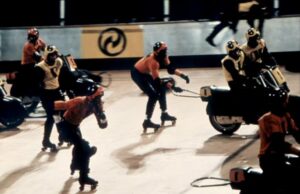Rollerball (1975) review
Dir. Norman Jewison
By: Steve Pulaski
Rating: ★★★
🕯️ Remembering Norman Jewison 🕯️
🕯️ 1944 – 2024 🕯️
Can we all take a minute and appreciate the impeccable talent and prowess of director Norman Jewison? It could be stated that no other American director is better at handling productions on as large of a scale as Jewison and few so consistently succeed at combating audience’s high expectations with full-fledged ambition. You could also make the argument that taking on so many radically different projects in the 1970s should’ve resulted in many films of varying quality. Part of Jewison’s brand is consistency as much as it is laudable filmmaking.
Rollerball follows the immaculate film adaptation of Fiddler on the Roof and the ceaselessly intriguing Jesus Christ Superstar to be Jewison’s third film of the 1970s. Unlike the digestible musicals that came before it, made noteworthy by their lively arrangements and genre-defining features, Rollerball couldn’t be more of a stark contrast in style and narrative. It’s an eerie, dystopian ode to a nightmarish future centered on a violent sport that has captivated an audience of millions.
The sport is played in a roller-rink of sorts and involves its players frequently doing laps around the track while trying to score by dropping a ball into a hole after having had possession of it for the duration of an entire lap. Some players use motorcycles or other makeshift vehicles to intensify things, in part making things easier for themselves yet placing a target on their back to be taken out by opposing players. Set in 2018, we drop in on Jonathan E. (James Caan), a Rollerball veteran, has his Houston team beats Madrid in a violent and competitive game. As the twilight of Jonathan’s career comes to fruition, the chairman of an energy corporation (John Houseman) suggests a commemorative documentary on his life and legacy is in order. He wants Jonathan to retire and be treated to a nice retirement package he’s earned through years of dedication and hard-work. Jonathan doesn’t want to retire, even at the request of his ex-wife Ella (Maud Adams), and can’t figure out why he’s being pushed out of the league for which he’s done so much. Pressure looms, sponsors begin forcing the hand of the league’s commissioner to rig the rules to make the game more violent, hoping Jonathan will be figuratively and literally knocked out and forced to hang up his skates.
In the present day, notwithstanding that we are currently living in/around the time in which this film is set, a movie about an unrelenting and violent game gaining momentum yet leaving its players with irreparable physical and mental damage sounds frighteningly close to the current, controversial state of the NFL. The parallels are also present in the film’s depiction of corporate control; a world where companies too big to fail call the shots and their power and influence triumphs even the densest book of safety regulations.
Jewison and writer William Harrison (who wrote the source of the film’s inspiration, a short-story by the name of “Roller Ball Murder”) amplify this subtext by housing it in a film predicated upon intense, stylized mayhem. Rollerball is not a film that’s overly bloody, but like a football game, it’s capable of making you wince and grit your teeth just as hard. Its direction from Jewison is nothing short of gorgeous as he handles the wide-shots of competition just as well as he captures the conflicting human drama so ubiquitous in Jonathan’s current circumstance. Throughout, however, Harrison’s social commentary is boundless, though occasionally underexplored. The film feels too focused on the masculine shell of Jonathan and, as a result, doesn’t always seem as fascinated with the effect this game has on the society who makes a game like this exist. Jewison can disguise this through endlessly entrancing, almost hypnotic shots of Rollerball players circling the rink and narrowly avoiding (or succumbing) to the peril of the game, but the onus of Harrison to highlight key themes becomes a burden on the audience upon the realization that the legwork isn’t so much being asked of the viewer but shifted to them. Here’s a great, substantive idea. You figure it out.
With that being said, Rollerball still deserves to be discussed and praised at least half as much as Blade Runner. Even for its futuristic visuals and sensibilities, Jewison’s film has more to relate with our world in the present than the latter film does to this day. Both films are incredibly dense, if in different ways, and Rollerball dares venture, even if only to modest success, in dramatic territory that does its part to bridge the gap between futurism and humanism. It’s only right that a little friction ensues.
NOTE: As of this writing, Rollerball is available to stream on Pluto TV and Tubi, free of charge.
Starring: James Caan, Maud Adams, John Houseman, and John Beck. Directed by: Norman Jewison.
About Steve Pulaski
Steve Pulaski has been reviewing movies since 2009 for a barrage of different outlets. He graduated North Central College in 2018 and currently works as an on-air radio personality. He also hosts a weekly movie podcast called "Sleepless with Steve," dedicated to film and the film industry, on his YouTube channel. In addition to writing, he's a die-hard Chicago Bears fan and has two cats, appropriately named Siskel and Ebert!


